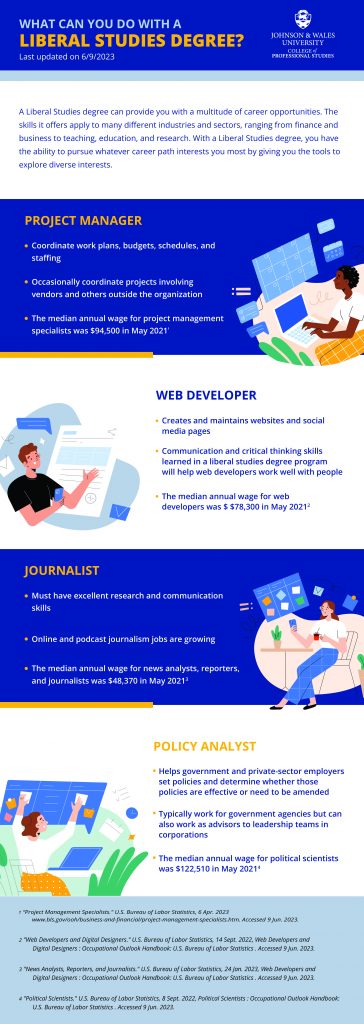A few generations ago, a college education was considered a way to increase your knowledge of a broad range of subjects and become more conversant in things like literature, history, social science, and philosophy. A college education traditionally also encouraged critical thinking and problem-solving skills. More recently, however, college has become a way to train for a specific job. However, the pendulum is beginning to shift again towards a broader education, making a degree in liberal studies a popular choice.
What is a bachelor’s degree in liberal studies?
A liberal studies degree, also sometimes referred to as a liberal arts degree, is a four-year Bachelor of Arts or Bachelor of Science degree that includes coursework in various subjects, ranging from the theater arts to economics. Emphasis is put on problem-solving skills, critical analysis, and research.
Definition of Liberal Studies
Liberal studies is an interdisciplinary field that offers students the opportunity to explore a wide range of subjects, helping them develop critical thinking, communication skills, and a deep understanding of different perspectives. A bachelor’s degree in liberal studies provides a well-rounded education that prepares graduates for diverse career paths and lifelong learning.
5 Benefits of a liberal studies degree
There are numerous benefits to pursuing a degree in liberal studies. One could argue that you’ll become a more interesting person and be able to converse knowledgeably on various topics, including foreign languages, not to mention understanding references to literature in speeches, articles, and books. However, that’s really just a side benefit of a liberal studies degree. Earning this type of degree sharpens your research skills and ability to analyze and digest information.
Those with a liberal studies degree are well-equipped for professions that straddle the boundaries of many disciplines. That includes careers like journalism, speech writing, policy analysis, and project management.
Stronger Communication Skills
Having a liberal studies degree can significantly enhance your communication skills, making it an ideal degree for preparing liberal arts students for the workforce. This includes written and verbal communication, which are crucial in a wide range of careers. The interdisciplinary nature of liberal studies allows you to effectively convey complex ideas and information to diverse audiences, making you a valuable asset in any professional setting requiring strong communication abilities.
Enhanced Research Skills
Earning a liberal studies degree not only broadens your knowledge base but also sharpens your research skills. The interdisciplinary nature of the program hones your ability to gather, analyze, and synthesize information from various sources. These enhanced research skills are invaluable in professions that require critical thinking, problem-solving, and decision-making based on complex data and perspectives. Whether you’re delving into policy analysis, journalism, or project management, having strong research skills will set you apart in your field.
Diverse Coursework
Most people complete this degree in four years, going to classes full-time. Coursework for a liberal studies degree stresses communication and critical thinking skills, including subjects such as psychology, sociology, anthropology, criminal justice, and economics. You’ll take writing and oral presentation classes and introductory courses in these subjects, as well as other areas of study such as history, cultural studies, literature, and philosophy. Emphasis is placed on applying criteria from different disciplines to examine complex issues, analyze arguments, conduct credible research, solve problems, make ethical decisions, and create original ideas and approaches.
Wide Variety of Career Options
A liberal studies degree opens up a vast array of career possibilities due to its interdisciplinary nature. Professionals with this degree are well-suited for roles in journalism, speech writing, policy analysis, and project management that require a combination of skills from various disciplines. The strong communication and research skills developed through a liberal studies program make graduates versatile and adaptable in today’s dynamic job market, where expertise across multiple fields is highly valued.
Be More Prepared for Graduate School
An undergraduate degree in liberal studies prepares students for further graduate-level education in a wide range of disciplines. In addition, corporate culture increasingly stresses interdisciplinary collaboration. It’s no longer enough to be proficient in one area; the successful employee is expected to work well with those from various backgrounds and disciplines. A liberal studies degree gives students an edge on presentation and communication skills and exposes them to other fields of study, so they can better relate to the people on their project team.
What can you do with a liberal studies degree?
A Liberal Studies degree can provide you with a multitude of career opportunities. The skills it offers apply to many different industries and sectors, ranging from finance and business to teaching, education, and research. With a Liberal Studies degree, you have the ability to pursue whatever career path interests you most by giving you the tools to explore diverse interests. That could mean taking on a leadership role in government or becoming an entrepreneur and starting your own small business. Additionally, this degree gives students the foundation for pursuing higher-level degrees, such as an MPA. Whatever route you decide to take in life, this liberal arts degree allows cross-disciplinary work so that you can be successful at multiple interests together.

Project Manager
Project managers work with employees from several departments to achieve a specific goal. They coordinate work plans, budgets, schedules, and staffing. Project managers generally work with other employees of a single corporation but occasionally coordinate projects involving vendors and others outside the organization.
According to the US Bureau of Labor Statistics (BLS), the median annual salary for a project manager in the United States is $98,580. Your salary will depend on your experience, job responsibilities, location, and company size.
Web Developer
A web developer is another career that uses skills learned in a liberal studies degree program. A web developer creates and maintains websites and social media pages. While some computer skills are necessary for this position, the communication and critical thinking skills learned in a liberal studies degree program will help web developers work well with people.
According to the BLS, the median annual salary for a web developer in the United States is $92,750. This is also a career that is growing much faster than average. The BLS estimates that there will be a 16% increase in web developer positions between 2022 and 2032.
Journalist
Journalists must have excellent research and communication skills, which can be gained from earning a liberal studies degree. While print journalism has had its challenges in recent years, online and podcast journalism jobs are growing. According to the BLS, the median annual salary for a US-based journalist is $57,500.
Policy Analyst
A policy analyst helps government and private-sector employers set policies and determine whether those policies are effective or need to be amended. Policy analysts typically work for government agencies but can also work as advisors to leadership teams in corporations. Again, communication and critical thinking skills are essential for success in this career.
According to Glassdoor, the median Policy Analyst salary is $103,000. Salary ranges can vary widely depending on many important factors, including education, certifications, additional skills, and the number of years you have spent in your profession.
Liberal Arts Degree in Today’s Workforce
In today’s ever-changing work environment, a liberal arts degree is more relevant than ever. This course of study helps you prepare for any and all eventualities with stellar analysis and communication skills. Today, the average worker will hold 12 jobs before they retire. Nearly one-third of these people (29%) will change careers completely during their work life. A liberal arts degree helps you learn skills you’ll use in your job, no matter what field you end up working in.
Employers Increased Attraction Toward Liberal Arts Degree Graduates
Employers increasingly see the value in the skills learned in a liberal arts degree program. According to the Association of American Colleges and Universities (AACU) president Lynn Pasquerella, critical thinking stemming from a liberal arts education is “more valuable than ever.” She adds, “In a world that is increasingly globally interdependent, and where rapidly changing technology means rapid obsolescence, the best we can offer students today is the capacity to work with others who are different from themselves in diverse teams. And to be adaptable and flexible in a world where the jobs of the future have not yet been invented,”
Earn your liberal arts degree at Johnson & Wales Online
Johnson & Wales Online offers a four-year Bachelor of Science degree in Liberal Studies. Students can opt to complete their degree with classes in person or online. Online learning is a convenient and affordable option and allows students to complete coursework on their own schedule and set their own school hours within certain parameters. Online learning is an excellent option for students who are employed full-time, live far away from a university campus, and those with family and civic responsibilities.
For more information about completing your degree online, complete the Request Info form, call 855-JWU-1881, or email [email protected].
